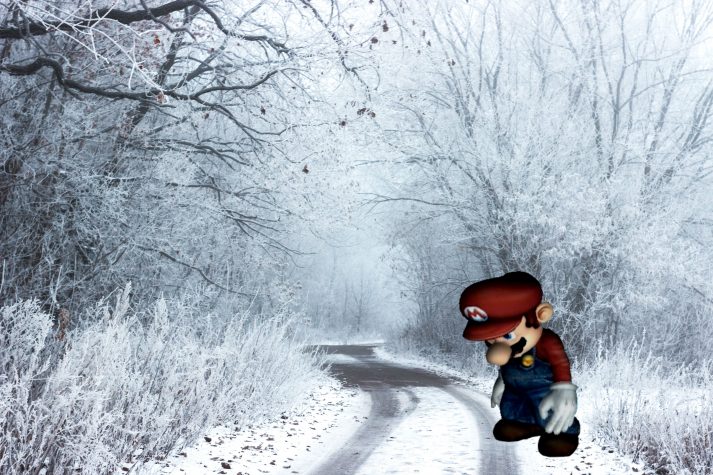This is an article from mental health wizard and resident NF Family Rebel Correspondent, Dan Schmidt.
Brace yourself, it’s here.
Winter. Bigger jackets, colder mornings, mental health disorder subsets, shorter days, umbr- …wait… what was that last one? Umbrellas? No, no, the other one. Oh, you haven’t heard of SAD? Well, let me tell you all about this frosty behemoth.
Aside from being a really clever acronym, Seasonal Affective Disorder (SAD) is a mood disorder that, spoiler alert, has a seasonal pattern. It’s also known as winter depression, winter blues or seasonal depression. In a nutshell, SAD makes people with ‘normal’ mental health experience depressive symptoms at a specific time each year, most often winter.
SAD can a cruel, powerful, and damaging arctic foe. But armed with the right weapons, we can ward off the winter monster, or even keep it in full hibernation.
Disclaimer: Today we’re going to be discussing some issues that may be difficult for some going through a tough time. If you (or someone you know) aren’t coping so well, PLEASE see the links at the bottom of this article with some resources from all around the world. Obviously, we recommend discussing this information with your health professional – none of this is a diagnosis, but rather a starting point for discussion.
Do you have SAD?

Most of us feel a little glum in winter… it’s natural to feel a little down.
Cold mornings, less time outside, and often it’s not as easy to get out and do our favourite things (for me, it’s golf). So for a lot of us, winter just sucks a little. (Sorry guys, I feel bad writing this from the Land Down Under where we’ve just hit summertime.)
We’ve known something was up since the 6th century, but SAD remained a mythical creature until the 1980s in the West when it became officially recognized as a mood disorder. While we’re still not 100% sure of how it works, it’s pretty clear to see that SAD especially thrives in the cooler, darker climates. For example, studies show SAD’s prevalence in the U.S. ranges from around 1% in Florida to 9% in Alaska. Looking around the world, in Oslo, Norway, around 14% of the population will be impacted by SAD, while us lucky buggers Down Under are barely impacted at all, with estimates that only around 1 in 300 Aussies (0.33%) will experience SAD during the “winter.”
Yes, SAD can occur for some people during summer and other seasons, but this is particularly rare compared to winter prevalence.
Common SAD symptoms include:
- low mood for most of the day.
- loss of interest in your usual activities.
- drowsiness and low energy (lethargy)
- fatigue, irritability, and severe mood swings
- Irregular sleep patterns (too much and/or too little)
- eating more than usual, especially craving sugar and carbohydrates, leading to weight gain
- loss of interest in things you normally enjoy doing
- intrusive or disturbing thoughts
Depression is not just a fancy word for feeling “bummed out”, SAD is just as serious as any other depression and needs to be dealt with promptly and effectively. (See the end of the article for a list of mental health services links.)
“But how do I know the difference between general winter glumness, or if I’m being mauled by the SAD beast like Leo in the Revenant?”
Ask yourself these questions:
- “Do you feel like you can’t get yourself out of this rut?”
- “Have you lost an interest in things that you usually enjoy?”
- “Have you felt this way for more than two weeks?”
If so, then it could be time to have a chat to a professional and perhaps seek treatment. Once again, SAD is just as real and can be just as devastating as Major Depressive Disorder, the only difference is the yearly regular onset. This bitter beast can take over someone’s entire wellbeing, and left untreated, the consequences can be devastating.
So let’s learn how we can slay the SAD, or even better, keep it in hibernation this year, so we nerds can continue to conquer all year round.
so Let’s slay, okay?

As with any injury or illness boss battle, you need to use the right medicine weapon to save the day. And there are many weapons you can equip yourself with to slay SAD:
GET SOME LIGHT:
Light helps the body produce seratonin (hormone that affects mood) and reducing the production of melatonin (hormine that makes you sleepy).
Starting with natural light is best, even though it’s not easy. If the sun happens to be peeking out from the clouds, try and get outside for a nice walk. Even on cold or cloudy days, outdoor light can help, particularly in the morning. Making your your work and home environments as light and airy as possible and sitting near windows can help too.
If you feel you’re just simply not able to get enough natural light, ‘Light Therapy’ is generally one first weapons picked up to slay for SAD. It can start alleviating symptoms in just a few days and rarely causes any side effects. It’s incredibly simple, and sitting under bright fluorescent globes or in front of a light box (again, particularly in the morning) has shown to be effective against SAD (Anecdotal, but I even once met a young woman who started to feel better just by increasing the wattage of her bedroom lightglobes).
EXERCISE AND DIET
Surprise, surprise, our old friends come to the rescue once again. It’s clear that exercise and eating well are key in keeping the blues at bay, so rug up and take a long walk and be sure to exercise regularly. Exercise and other types of physical activity help relieve stress and anxiety, both of which can increase SAD symptoms.
If you’re really keen to take on winter, try the Winter Is Coming Workout and start building that summer body early. For those who don’t like the freezing weather, that’s cool (get it?), you can always do Steve’s 20 minute hotel room workout (pro tip: you don’t actually need to be staying in a hotel room to do the workout… that was $250 I’ll never get back), or even join the Nerd Fitness #YogaEveryDay challenge (which my wife is totally kicking my ass in) if you haven’t signed up already.
As for diet, Steve has already highlighted, if you’re going to eat unhealthy foods during winter, let’s at least be smart about it and negate the impact the holidays have on our waistlines. Try your best to provide a counter balance to those comfort foods and keep your diet as close as what it is the rest of the year.
THERAPY
Talk Therapy (Psychotherapy) and cognitive behavioral therapy sound scary, but really aren’t. Psychotherapy focuses on helping you to build skills to deal with the stresses in your life, along with identifying and changing negative thinking patterns. Therapies such as these assist you in retraining some of the patterns and thoughts in your life that aren’t doing you any good.
You can read the Nerd Fitness Guide to Mental Health.
It can feel daunting, and really weird, ‘opening up’ to a stranger at first, but having a coach to talk through your negative thoughts and feelings, and how to manage them better is generally quite effective. Most people will notice an improvement in as little as two weeks. Really, the “weird” stigma is usually the biggest barrier to even doing the thing in the first place!
GET SOME VITAMIN D
When exposure to sunlight is low, your body makes less Vitamin D. According to this study, Vitamin D deficiency affects nearly HALF of the world population. It is important for overall health. Our friends over at Examine say that if your diet is decent and there’s only one supplement you’re taking, it should probably be Vitamin D during these upcoming months.
The research is a little mixed when it comes to Vitamin D’s effectiveness in battling SAD, but some studies do show an improvement to everyone’s depression scale scores (those with or without SAD). Overall, if you aren’t getting enough sunlight in the winter, consider picking up some Vitamin D!
GET AWAY
If you’re lucky enough to have the opportunity, take a winter holiday in a sunny, warm location if you feel the SAD is lurking too close to home. If you’re looking to save some cash, I’m happy to have any Alaskan rebels crash on my fold out couch during the Aussie summer (a love of cricket, barbeques and beer is a must (BYOBB)).
Finally, some people with SAD benefit from antidepressant treatment, especially if symptoms are severe. We’re not here to offer any medical advice, so please see your doctor if you think medication may assist you.
This too shall pass

It’s normal to have some days when you feel down, and the holiday season can be especially hard for some.
When short days and miserable weather are piled on top of this, it’s easy to see why ‘winter blues’ is so common. But if you feel down for days at a time and you can’t get motivated to do activities you normally enjoy, please speak to someone and see your doctor. This is especially important if your sleep patterns and appetite have changed, feel a sense of hopelessness, have intrusive thoughts, or turn to alcohol/substances for comfort or relaxation.
Above all, take care of yourself this winter. Be sure to get enough rest and take the time to relax. Participate in an exercise program or engage in another form of regular physical activity. Get outside when you can. Make healthy choices for meals and snacks when possible. Reach out to a trusted friend, family member, or health professional if you feel you’re having a tough time.
And if someone reaches out to you, remember: We are Rebels, we fight conventional wisdom and smash stigmas, never leaving a fellow nerd behind.
If you feel the bitter arctic beast starting to rise from its summer slumber, remember that you are not alone, and there are ways to slay the frosty fiend. You are strong enough to beat this, and the entire rebellion have got your back.
Rebels, take care of yourself, and each other.
Do you have your own secret weapon to slay the SAD? We’d love to hear from all you rebels about how you keep your mind healthy during winter, the more ideas we all have, the better, let us know in the comments.
Better yet, you can show us all you winter mind fitness strategies, tag your pics with #SlayTheSAD on Instagram, Twitter and Facebook. Feel free to follow us if you don’t already, @nerd_fitness on instagram, @nerdfitness on twitter, and Dan goes by @SkaSchmidt on both.
– Dan
PS – Don’t forget that we’re also running our #YogaEveryDay challenge, play along with your fellow rebels using our group google doc.
###
If you, or someone you know, would like further support, here are some excellent links and services that will get you started in the right direction:
North America – Suicide Prevention Lifeline, List of Mental Health hotlines
Canada – Mental Health Helpline, List of Mental Health services
Great Britain & Ireland – Samaritans, List of services via Mental Health Foundation
Australia – National helplines and websites, Lifeline, headspace
New Zealand – Lifeline, Mental Health helplines
India – SNEHA
Norway – Suicide hotline
Worldwide – Worldwide mental health hotlines, Worldwide suicide hotlines, Befrienders Worldwide
source https://www.nerdfitness.com/blog/is-seasonal-affective-disorder-a-real-thing-how-to-slay-the-sad-beast/

No comments:
Post a Comment